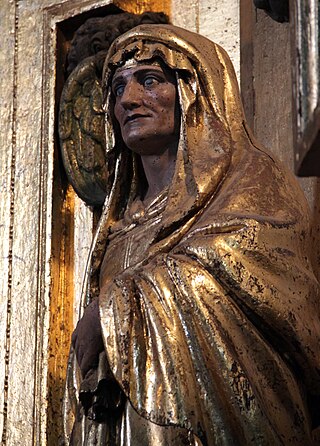Related Research Articles
Astrid is a given name of Scandinavian origin, a modern form of the name Ástríðr. Derived from the Old Norse Ássfriðr, a compound name composed of the elements áss and fríðr.

Lucy is an English feminine given name derived from the Latin masculine given name Lucius with the meaning as of light. Alternative spellings are Luci, Luce, Lucie, Lucia, and Luzia.
Anya, Ania or Anja is a given name. The names are feminine in most East European countries and unisex in several African countries.

Mottama is a town in the Thaton District of Mon State, Myanmar. Located on the west bank of the Thanlwin river (Salween), on the opposite side of Mawlamyaing, Mottama was the capital of the Martaban Kingdom from 1287 to 1364, and an entrepôt of international repute until the mid-16th century.
Lina is an international feminine given name, mostly the short form of a variety of names ending in -lina including Adelina, Angelina, Carmelina, Carolina, Catalina, Emelina, Evangelina, Evelina, Karolina, Italina, Marcelina, Melina, Nikolina, Paulina, Rosalina, and Žaklina.
Josephine is a female name. It is the English version of the French name Joséphine, itself a female variant of the name Joseph, which is ultimately derived from the Hebrew name Yosef, meaning "he shall add/grow".
Orla is an anglicisation of Órfhlaith, a feminine given name of Irish origin. The name is often interpreted as meaning "golden princess", as it is derived from the Irish words ór ("gold") and flaith.
Seong (Korean: 성), also spelled Song or Sung, is an uncommon Korean family name, a single-syllable Korean given name, as well as a common element in two-syllable Korean given names. The meaning differs based on the hanja used to write it.
Bo is a given name of Norse and Chinese origin.
Trisha is either:

Sina and the Eel is a myth of origins in Samoan mythology, which explains the origins of the first coconut tree.
Mina is a given name with a variety of origins.
Binnya U was king of Martaban–Hanthawaddy from 1348 to 1384. His reign was marked by several internal rebellions and external conflicts. He survived the initial rebellions and an invasion by Lan Na by 1353. But from 1364 onwards, his effective rule covered only the Pegu province, albeit the most strategic and powerful of the kingdom's three provinces. Constantly plagued by poor health, U increasingly relied on his sister Maha Dewi to govern. He formally handed her all his powers in 1383 while facing an open rebellion by his eldest son Binnya Nwe, who succeeded him as King Razadarit.
Nana is a given name that has different origins in several countries across the world. Its use as a feminine or masculine name varies culturally. It is feminine in Japan, Georgia, Serbia and Greece, it is masculine in Ethiopia and India, and epicene in Ghana and Indonesia. In Georgia, Nana is the fifth most popular given name for girls. In Ghana, among the Akan people, particularly the Akyem, Ashanti and Akuapim peoples, Nana is used as the title of a monarch to signify their status. Furthermore, the stool names of kings and queens are always preceded by Nana. Non-royal Ghanaian people also use Nana as a given name. In some cases, they may adopt the name Nana, if they have been named after a monarch. In Ghana, one can respectfully refer to a King or Queen as Nana without mentioning their full name; much like using "Your Highness". In India, nana means father in Telugu language and grandpa in Hindi and Urdu language from the mother's side.
Kim is a unisex given name. It is also used as a diminutive or nickname for names such as Kimber, Kimberly, Kimberley, Kimball and Kimiko. In Kenya, it is short for various male names such as Kimutai and Kimani. In Vietnam, it is also a unisex name.

Naomi or Noemi is a given name of separate biblical Hebrew and Japanese origin used in various languages and cultures.
Yoon-jung, also spelled Yoon-jeong, Youn-jeong, or Yun-jeong, is a Korean unisex given name. Its meaning depends on the hanja used to write each syllable of the name. There are 16 hanja with the reading "yoon" and 75 hanja with the reading "jung" on the South Korean government's official list of hanja which may be registered for use in given names.

Moana is a 2016 American animated musical fantasy adventure film produced by Walt Disney Animation Studios and released by Walt Disney Pictures. The film was directed by John Musker and Ron Clements, co-directed by Chris Williams and Don Hall, and produced by Osnat Shurer, from a screenplay written by Jared Bush, and based on a story conceived by Clements, Musker, Williams, Hall, Pamela Ribon, and the writing team of Aaron Kandell and Jordan Kandell.

Moana of Motunui is the title character of the 2016 Walt Disney Animation Studios film Moana. Created by directors Ron Clements and John Musker, Moana is voiced by Hawaiian actress and singer Auliʻi Cravalho. As a toddler, she is voiced by Louise Bush. Moana returns in the sequel film Moana 2, which premiered in November 2024, again voiced by Cravalho, as well as a live-action remake film, in 2026, in which she will be portrayed by Catherine Laga'aia.
Smin Bayan was an early 15th century commander who fought on both sides of the Forty Years' War between Hanthawaddy Pegu and Ava. He is best known in Burmese history for successfully driving back a Chinese invasion in 1414–1415 on behalf of his former enemy Ava.
References
- 1 2 "Tala - Name Origin, Meaning and Statistics". Nordic Names Wiki.
- ↑ Bengt R. Jonsson, Margareta Jersild, Sven-Bertil Jansson. (2001). "Sveriges medeltida ballader: Skämtvisor II", Almqvist & Wiksell International
- ↑ Hill, Percy. A. (1934). Philippine Short Stories, p65
- ↑ Pratt, George (1878). A grammar and dictionary of the Samoan Language: Edited by Rev. S. J. Whitmee. Trübner & Company. p. 333.
- ↑ Kandimba, Aristóteles (2023). The Book of Names from Angola (1st ed.). p. 150. ISBN 979-8857554524.
- ↑ "Герр Хольгер — Скандинавские баллады — Тексты — Северная Слава".